英语词汇的奥秘 Secrets of English Words
英语词汇的奥秘智慧树知到答案章节测试2023年武昌工学院

第一章测试1.The clock struck six ______as I arrived.()A:justB:whileC:afterD:when答案:B2. a person who is an expert in law is a ___________.()A:juryB:juristC:justiceD:prejudice答案:B3.It took her a while to_______ to living alone. ()A:aidedB:adjustC:adoptD:alarm答案:B4._________ mean(s) slightly warm, sometimes in a way that is not pleasant.()A:coolB:coldC:tepidD:hot答案:C5.If you ______a problem, I will try my best to help you.()A:comeB:crossC:seeD:meet答案:D6.Justitia在拉丁语中就是“正义”的意思。
()A:对B:错答案:A7.greenhouse 是表示绿色的房子的意思。
()A:错B:对答案:A8.greenhorn 是绿色的小号。
()A:对B:错答案:B9.Fear,terror, trepidation 都表示恐惧,其中fear常用于口语交际。
()A:对B:错答案:A10.salt of the earth指世界上的盐。
()A:对B:错答案:B第二章测试1.Ex-boyfriend, foretell and post-election contain________.()A:prefixes of degree or sizeB:negative prefixesC:prefixes of time and orderD:locative prefixes答案:C2.The suffixes in words clockwise, homewards are ______.()A:adverb suffixesB:verb suffixesC:adjective suffixesD:noun suffixes答案:A3.The prefixes in words anti-government, pro-China and contraflow are _____.()A:prefixes of degree or sizeB:miscellaneous prefixesC:prefixes of time and orderD:prefixes of orientation and attitude答案:D4.The suffixes in words heighten, symbolize are ________. ()A:noun suffixesB:verb suffixesC:adverb suffixesD:adjective suffixes答案:B5.The root anim in words unanimous, animal and animate is called bound root.()A:错B:对答案:A第三章测试1.以下可以组成复合名词的一项是()。
破解英语词汇记忆的密码

丑
祭
冠
慧
君
承
贵
(李乐毅,2006)
典
弄
手,爪,印,采, 丑,拜,扶,友, 祭,寸,受,守, 冠,慧,君,承, 贵,典,弄
manage
(经手→管理)
recommend
(因信任交到另一个人手里 →推荐)
man,men 手
2、记住词根或部首并不等于 记住了单词的词义
“惢”(读suǒ)的部首是“心”? doubt中的词根dou是“二”
字根与部首之 间有着广泛的 一致性。
许慎的《说文解字》: 共收9353个汉字 540个部首 新华字典:189部
英语的词汇估计超过100万个,但 也可按其词中意思基本相同的部分 把它们归在非常有限的词根下。
expect, inspect, prospect, respect, spectacle suspect
bend/bend/说明“捆绑”时绳子要“弯曲”才行; bind/baind/表示把纸“绑”在一起而“装订”;
Bond 意思和谐音“绑的”差不多
bond/bnd/“绑”会把人“套牢”→债券,契约;
bundle/bndl/指的是“捆绑” 起来的小的“捆,包, 束”
(李乐毅,2006)
束
World ?
angle ankle
g-h 对应
红 gōng hóng
gōng:女红 Hóng :红火
guest hostess
h-k 对应
吭 háng kēng
háng :引吭高歌; kēng:吭声,一声不吭
short color shirt hole skirt
d-t 音
弹 dàn tán
dàn:子弹; tán:弹钢琴
词源爱好者家园20120518-夏啰啰整理

1,翻译“无边落木萧萧下,不尽长江滚滚来”hawkie:who can translate this: 无边落木萧萧下不尽长江滚滚来any volunteers?余光中说,这两句诗你把世界上最好的翻译叫来也不好翻译,为什么?“无边落木萧萧下”,萧萧是草字头,木翻出来,草字头翻不出来。
“不尽长江滚滚来”,长江的江是三点水,滚滚的滚又是三点水,也没有办法翻出来帝皇侠:这难度,只能到信的层次了,翻译成“树叶落着,江水流着”dfo:hoho 确实是这么回事Leaves are dropping down like the spray of a waterfall, While I watch the long river always rolling on. hawkie:翻译巨擘许渊冲老先生的译文:The boundless forest sheds its leaves shower by shower;The endless river rolls its waves hour after hour.无边boundless 不尽endless为了和shower押韵,加了hour after hour (加强了也可能是重复了endless的意思)2,词源和词根词缀的联系?怎样入手词根词缀才能接近词的本源?Ch:我有个比较愚的问题,词源和词根词缀有什么联系呢?William:词源是词的来历,词的历史;词根词缀是一个词的分解组合,一般它们都有来历Grace:你这个解释,真不妥当。
William:随手瞎写了,你来解释下。
Grace:我觉得他这个问题问得很好,也是我想问的,我等老师们来解答。
我加一个问题就是:到底怎么样入手词根词缀才能更加接近词的本源,因为袁老师推荐的词源入门的初级读物基本上都是词根词缀相关的书。
William:研究语言就怕把“历时”和“共时”混在一起说,混在一起说就乱了,让人理不清了。
词根和词缀很多时候,名和实与古代有很大的区别,若不做专门研究,对初期语言学习会造成混乱的。
快速记忆英语-英语词汇的奥秘
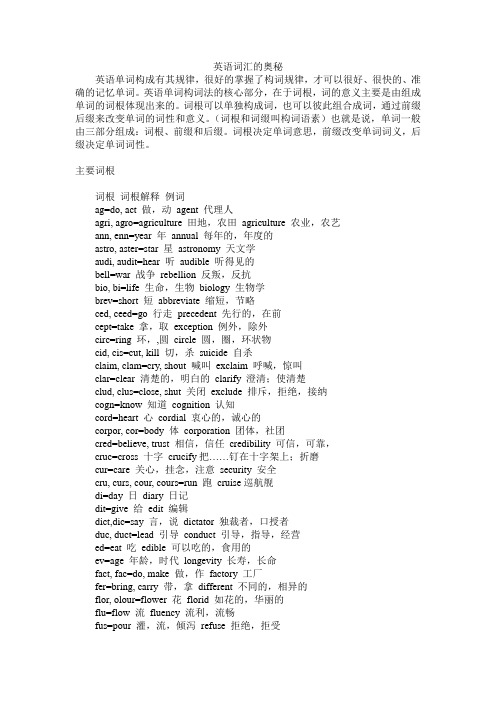
英语词汇的奥秘英语单词构成有其规律,很好的掌握了构词规律,才可以很好、很快的、准确的记忆单词。
英语单词构词法的核心部分,在于词根,词的意义主要是由组成单词的词根体现出来的。
词根可以单独构成词,也可以彼此组合成词,通过前缀后缀来改变单词的词性和意义。
(词根和词缀叫构词语素)也就是说,单词一般由三部分组成:词根、前缀和后缀。
词根决定单词意思,前缀改变单词词义,后缀决定单词词性。
主要词根词根词根解释例词ag=do, act 做,动agent 代理人agri, agro=agriculture 田地,农田agriculture 农业,农艺ann, enn=year 年annual 每年的,年度的astro, aster=star 星astronomy 天文学audi, audit=hear 听audible 听得见的bell=war 战争rebellion 反叛,反抗bio, bi=life 生命,生物biology 生物学brev=short 短abbreviate 缩短,节略ced, ceed=go 行走precedent 先行的,在前cept=take 拿,取exception 例外,除外circ=ring 环,,圆circle 圆,圈,环状物cid, cis=cut, kill 切,杀suicide 自杀claim, clam=cry, shout 喊叫exclaim 呼喊,惊叫clar=clear 清楚的,明白的clarify 澄清;使清楚clud, clus=close, shut 关闭exclude 排斥,拒绝,接纳cogn=know 知道cognition 认知cord=heart 心cordial 衷心的,诚心的corpor, cor=body 体corporation 团体,社团cred=believe, trust 相信,信任credibility 可信,可靠,cruc=cross 十字crucify把……钉在十字桇上;折磨cur=care 关心,挂念,注意security 安全cru, curs, cour, cours=run 跑cruise巡航舰di=day 日diary 日记dit=give 给edit 编辑dict,dic=say 言,说dictator 独裁者,口授者duc, duct=lead 引导conduct 引导,指导,经营ed=eat 吃edible 可以吃的,食用的ev=age 年龄,时代longevity 长寿,长命fact, fac=do, make 做,作factory 工厂fer=bring, carry 带,拿different 不同的,相异的flor, olour=flower 花florid 如花的,华丽的flu=flow 流fluency 流利,流畅fus=pour 灌,流,倾泻refuse 拒绝,拒受geo=earth 地geography 地理学gon=angle角trigon 三角形grad=step, go, grade 步,走,级gradual 逐步的gram=write 写telegram 电报graph=write, writing 写,画photograph 照相,拍照gress=go, walk 行走progress 进步hap=chance,luck,accident 机会,偶发happen 发生,巧遇hibit=hold 拿,持exhibit 展出,展览hospit, hosp=guest 客人hospitable 好客的idio=particular, own, private, proper 特殊的,个人的,专有的idiom 惯用语,方言insul=island 岛insular 岛的,偏狭的it=go 行走exit 出口,退出ject=throw 投掷projection 投掷,发射lect, leg, lig=choose, gather 选,收elect 选举lev=raise 举、升elevate 抬起,使升高liber=liberty 自由liberation 解放lingu=language 语言linguist 语言专家liter=letter 文字,字母literate 识字的,有文化的loc=place 地方local 当地的log=speak 言,说dialogue 对话loqu=speak 言说eloquent 有口才的,雄辩的lun=moon 月亮lunar 月亮的,似月的nanu, man=hand 手manuscript 手稿mar=sea 海marine 海上的,航海的medi=middle 中间mediate 居中调解,调停memor=memory,mindful 记忆,记住的memory 记忆,记忆力milit=soldier 兵military 军事的,军队的mini=small,less 小minimum 最小数mir=wonder 惊奇,惊异admire 赞赏,钦佩mort=death 死mortal 终有一死的mot=move 移动motion 运动,动nomin=name 名nominal 名义上的,有名无实的nov=new 新novel 新的,新奇的numer=number 数numeral 数字,[语]数词oper=work 工作operation 手术,工作,操作ori=rise 升起orient 东方,东方的paci=peace 和平pacify 使和平,抚慰past=feed 喂,食pasture 放牧、牧场,吃草pel=push, drive 推,逐,驱propel 推动pend, pens=hang 悬挂pendent 悬空的,悬而未决的pet=seek 追求compete 竞争,比赛phon=sound 声音phone 电话plen=full 满,全plenty 大量,丰富pone=put 放置postpone 推后,推迟popul=people 人民population 人口,全体居民port=carry 拿,带,运import 输入,进口pos=put 放置expose 揭露,揭发preci=price 价值precious 宝贵的,珍贵的pur=pure 清,纯purify 使纯净rect=right, straight 正,直correct 改正,纠正rupt=break 破rupture 破裂,使裂开sal=salt 盐salary 薪水sci=know 知science 科学sec, sequ=follow 跟随sequence 继续,连续sect=cut 切割section 切开,一部分sent, sens=feel 感觉sentiment 感情,思想感情son=sound 声音sonic 声音的,音速的spect=look 看spectate 出席,观看spir=breathe 呼吸inspire 鼓舞,吸入tail=cut 切,割tailor 裁缝,成衣商tain, ten=hold 握,持,守contain 容纳,包含,内装tect=cover 掩盖detect 侦查,发觉tempor=time 时temporary 暂时的,临时的tend, tens=draw 拉tension 拉紧,引力tent, tract=draw 拉,抽,引tractor 拖拉机urb=city 城市suburb 郊区,近郊ut=use 用utility 效用, 有用vac, vacu=empty 空vacancy 空白,空虚vad, vas=walk, go 行走invasion 入侵,侵略vari=change 变化variable 可变的,反复的ven=come 来convene 召集(会议),集会vert, vers=turn 转subvert 推翻,颠覆vi, via=way 路via 取道,经由vis, vid=see 看visible 可见的,看得见的vit=life 生命vital 充满活力的viv=live 活vivid 活泼的,有生气的常见前缀开放分类:英语、语法、学习、词汇[prefix]以结合形式出现,与一词、词根或短语开头的一个音或连续几个音相接,或书写中一个字母或连续几个字母用以产生出派生词或变化形式。
英语单词的奥秘 超级10000单词第二部分
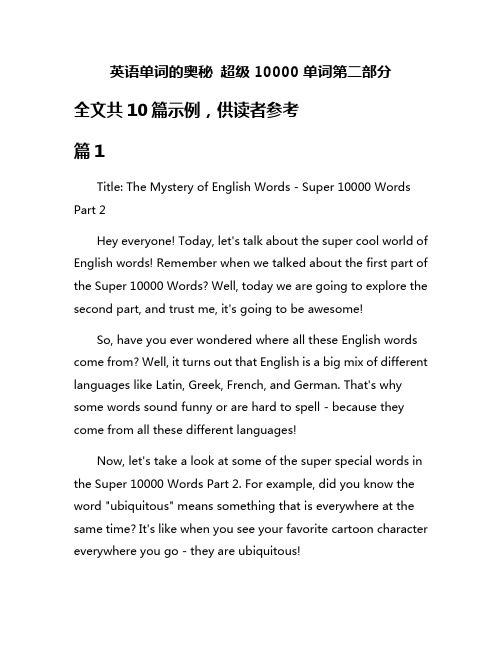
英语单词的奥秘超级10000单词第二部分全文共10篇示例,供读者参考篇1Title: The Mystery of English Words - Super 10000 Words Part 2Hey everyone! Today, let's talk about the super cool world of English words! Remember when we talked about the first part of the Super 10000 Words? Well, today we are going to explore the second part, and trust me, it's going to be awesome!So, have you ever wondered where all these English words come from? Well, it turns out that English is a big mix of different languages like Latin, Greek, French, and German. That's why some words sound funny or are hard to spell - because they come from all these different languages!Now, let's take a look at some of the super special words in the Super 10000 Words Part 2. For example, did you know the word "ubiquitous" means something that is everywhere at the same time? It's like when you see your favorite cartoon character everywhere you go - they are ubiquitous!And what about the word "onomatopoeia"? I know, it's a big word, but it just means words that sound like what they mean, like "buzz" or "moo". Isn't that cool?But wait, there's more! Have you ever heard of the word "serendipity"? It means finding something good without looking for it. Like when you find a dollar on the ground - that's serendipity!So, as you can see, English is full of amazing words that have all kinds of meanings and origins. It's like a big treasure hunt every time you learn a new word!I hope you had fun learning about the Super 10000 Words Part 2. Keep exploring the world of English words and you'll discover so many exciting things! Until next time, happy word hunting!篇2Hello everyone, I'm super excited to share with you the secret of English words! In the second part of "Super 10,000 Words", we're going to explore more interesting and awesome words that will blow your mind.Let's start with some cool animals' names like giraffe, kangaroo, and zebra. Did you know that these words come from different languages? Giraffe is from Arabic, kangaroo is from an Australian Aboriginal language, and zebra is from a Portuguese word. Isn't that amazing?Next, let's talk about some tricky words like camouflage, silhouette, and catastrophe. These words may sound complicated, but once you know their meanings, you'll be able to use them confidently in your everyday conversations.Now, let's move on to some fun and colorful words like rainbow, sunshine, and butterfly. These words can bring happiness and positivity to your day, so don't forget to use them often!Last but not least, let's explore some magical words like abracadabra, unicorn, and fairy tale. These words can spark your imagination and take you on adventures to far-off lands.Remember, English words are like treasure chests waiting to be discovered. So keep learning, keep exploring, and most importantly, have fun with new words every day!That's all for today's lesson on the secrets of English words. Stay tuned for the next part of "Super 10,000 Words" where we'lluncover even more fascinating words together. See you next time! Bye-bye!篇3Oh my gosh! Have you heard about the super secret of English words? It's like so cool! Remember the first part where we talked about the first 10,000 words? Well, there's a second part with even more awesome words to learn!In this second part, we get to discover another 10,000 words that are used in the English language. Can you believe it? That's like a whole bunch of new words for us to explore and learn about. It's like a treasure chest of words waiting for us to unlock their secrets!I bet you're wondering what kind of words are in this second part, right? Well, there are words for animals, colors, feelings, actions, and so much more! It's like a whole new world of words for us to discover and use in our everyday conversations.Learning all these new words might seem like a lot, but don't worry! We have our trusty dictionaries and teachers to help us along the way. We can also practice using these words in sentences and stories to make them stick in our minds.So, let's put on our explorer hats and dive into the world of English words in the super cool second part of the 10,000 word challenge! Let's learn, have fun, and become super smart word wizards together!篇4Hey guys, it's time for the super awesome Part 2 of the mysterious world of English words! If you thought Part 1 was cool, just wait till you hear about these 10000 really super-duper words that are gonna blow your mind!So, let's dive right in and explore some more amazing words that are gonna make you the smartest kid on the block!1. Abscond - This word means to leave hurriedly and secretly, typically to avoid detection or arrest. It's like disappearing into thin air!2. Donnybrook - A brawl or heated argument. Kinda like when your big bro and sis have a fight over who gets the last cookie.3. Inscrutable - Impossible to understand or interpret. Like trying to figure out why your cat knocks things off the table for fun.4. Jubilant - Feeling or showing great happiness and triumph. Just like when your team wins the big game!5. Defenestration - The act of throwing someone out of a window. Totally not something you should try at home!6. Exacerbate - To make a bad situation worse. Like when your teacher gives you extra homework on a Friday.7. Mellifluous - A sound that is sweet and smooth, pleasing to hear. It's like music to your ears!8. Quixotic - Extremely idealistic, unrealistic, and impractical. Kinda like trying to build a rocket ship out of Legos.9. Serendipity - The occurrence of events by chance in a happy way. Like finding money in your pocket that you forgot about!10. Vitriol - Cruel and bitter criticism or hatred. Not cool, dude!Wow, these are just a few of the many super cool words in our magical English language. So, keep on exploring, keep on learning, and who knows what awesome words you'll discover next time!Until then, stay curious and keep on rocking those words like a boss! See ya later, alligator!篇5Hello everyone! Today I want to talk to you about the mysterious world of English words. Remember how we learned about 10000 English words in the first part? Well, now we're going to dive into the second part of the super cool 10000 word list!So, you might be wondering, "How do we even know all these words?" Well, the truth is, there are so many words in the English language that it can be overwhelming. But don't worry, there are some tricks to help us remember them all!One trick is to break the words down into smaller parts. For example, take the word "happiness." We can break it down into "happy" and "ness," which makes it easier to remember. Another trick is to use mnemonics, which are memory aids that help us associate words with images or phrases.Did you know that some English words are actually borrowed from other languages? For example, the word "chocolate" comes from the Aztec word "xocolatl." And the word"pajamas" comes from the Hindi word "pāy-jāmah." It's like we're learning words from all over the world!It's also important to understand the different parts of speech, like nouns, verbs, adjectives, and adverbs. This helps us understand how words can be used in sentences and how they work together to communicate meaning.So, keep exploring the magical world of English words! Keep learning new words, practicing with friends, and having fun with the language. Who knows, maybe one day you'll be a master of all 10000 English words! Keep on spelling, my friends!篇6Once upon a time, in a magical land called Vocabulary Kingdom, there was a special place known as the Super 10000 Word Academy. It was a school where all the words in the English language went to learn and grow.In this academy, the words were divided into different levels based on their difficulty. The second part of the academy was for the super 10000 words, the most powerful and mysterious words of all. These words held great power and were only taught to the most advanced students.The students at the academy were a diverse group, with words like "elephant", "computer", "basketball", and "friendship" all learning together. They studied hard and practiced their spelling and pronunciation every day.But the real mystery of the super 10000 words lay in their meanings and origins. Each word had a story to tell, a history that went back hundreds of years. For example, the word "serendipity" came from a fairy tale about three princes who discovered a magical land by accident.As the students delved deeper into the world of these powerful words, they uncovered secrets and hidden meanings that had been lost to time. They learned that words were not just random sounds, but symbols of our shared human experience.And so, the students of the Super 10000 Word Academy continued their studies, exploring the vast and wondrous world of language. They knew that by understanding and using these powerful words, they could unlock endless possibilities and connect with people from all walks of life.And as they journeyed through the academy, they kept in mind the wise words of their teachers: "With great vocabulary comes great responsibility." And with that, they set out toconquer the mysteries of the English language, one word at a time.篇7Oh my gosh, have you heard about the super cool Super 10000 words in English? They are like the secret codes to unlock the magic of the language! In the second part of the series, we get to dig deeper into the mysterious world of English words and learn even more awesome stuff!First things first, let's talk about synonyms and antonyms. Synonyms are words that have similar meanings, like happy and joyful. Antonyms are words that have opposite meanings, like hot and cold. Knowing these can help us express ourselves better and sound super smart!Next up, we have compound words. These are words made by putting two or more words together. Like butterfly, rainbow, or superman! It's like mixing and matching to create new and exciting words!And don't forget about homophones! These are words that sound the same but have different meanings, like hear and here, or tail and tale. It's like a fun tongue twister that can trick your brain!Speaking of tricky words, have you ever heard of idioms and metaphors? Idioms are phrases that mean something different from what the words actually say, like raining cats and dogs or kick the bucket. Metaphors compare two things without using like or as, like time is a thief or she is a shining star. They make our language colorful and interesting!Last but not least, let's not forget about prefixes and suffixes. Prefixes are added to the beginning of a word to change its meaning, like un- (unhappy) or dis- (dislike). Suffixes are added to the end of a word to change its meaning, like -ful (beautiful) or -less (meaningless). They help us understand words better and expand our vocabulary!So there you have it, the awesome secrets of English words in the Super 10000 series! Remember, practice makes perfect, so keep exploring, learning, and having fun with the magic of language! Woohoo!篇8The secret of English words, super 10000 words part 2Hey guys, do you know what makes English words so cool and interesting? Well, let me tell you all about it in this super funarticle. We are going to explore the second part of the super 10000 words in English!First of all, have you ever wondered why there are so many words in the English language? It's because English has borrowed words from lots of other languages like French, Latin, and German. That's why you might see some words that look a little bit different but mean the same thing. Isn't that awesome?Next, let's talk about prefixes and suffixes. These are small parts that we can add to the beginning or end of a word to change its meaning. For example, adding "un" to the word "happy" makes it "unhappy", which means not happy. Cool, right?Another super cool thing about English words is homophones. These are words that sound the same but have different meanings. For example, "two", "too", and "to" all sound the same but they are used in different ways. Isn't that super interesting?Last but not least, let's talk about compound words. These are words that are made up of two or more smaller words. For example, "bedroom" is made up of "bed" and "room". It's like putting puzzles together to make a new word. How cool is that?So there you have it, the super awesome secrets of English words. I hope you had fun learning all about it. Keep exploring and discovering new words, and who knows, you might even become a super word master one day!篇9Title: The Mystery of English Words - Super 10000 Words Part TwoHey friends! Have you ever wondered why English has so many words? Well, let me tell you about the super amazing part two of the English word mystery - the Super 10000 Words! You won't believe how cool and fascinating it is!So, in the last part, we talked about the first 5000 Super Words and how they are used in our daily life. Now, let's dive into the second half - the next 5000 words! These words are also super special and important for us to know.Firstly, did you know that English has words from lots of different languages? It's like a big word party! We have words from French, Spanish, German, and even some from Chinese and Hindi! Cool, right?Next, let's talk about some really cool words that have interesting meanings. For example, did you know that the word "serendipity" means finding something good without looking for it? Isn't that amazing? There are so many fun words like this in English!And guess what? Some words in English are really big and complicated. Like "supercalifragilisticexpialidocious" from the movie Mary Poppins! Wow, try saying that five times fast!Now, let's not forget about all the slang words and popular phrases we use in English. They are like the secret code of cool kids! From "lit" to "YOLO", these words make English so fun and interesting.In conclusion, English words are like little treasures waiting to be discovered. They are powerful, exciting, and full of surprises. So let's keep exploring and learning new words every day!I hope you enjoyed learning about the Super 10000 Words in English. Stay curious and keep on learning, my friends! Bye for now!篇10Oh my gosh, I can't believe I actually made it to the second part of the Super 10000 Word Challenge! This challenge is so cool, and I'm learning so many new words. In this part, I'll be exploring even more words and unlocking the mysteries of the English language.One of the first words I encountered in this challenge is "bewilder." It means to confuse or puzzle someone, and I felt so bewildered when I first saw it. But now I know how to use it in a sentence like, "The tricky riddle bewildered me for hours."Another interesting word I learned is "capacious." It means spacious or roomy, like a big house or a roomy backpack. I can say, "I need a capacious bag to fit all my books for school."I also came across the word "dauntless," which means fearless and courageous. I want to be dauntless like a superhero when I grow up so I can help others and stand up for what's right.The word "ebullient" caught my attention too. It means cheerful and full of energy. I hope to be ebullient every day and spread my positivity to others.Learning new words is so much fun, and I can't wait to explore even more in this Super 10000 Word Challenge. It's likegoing on an adventure through the vast world of English vocabulary. I love discovering the meanings of words and using them in my everyday conversations.I'm so excited to continue this journey and become a super word wizard! Who knows what amazing words and their mysteries I will uncover next? Stay tuned for more epic word adventures in the Super 10000 Word Challenge Part Two!。
智慧树知到《英语词汇的奥秘》见面课答案
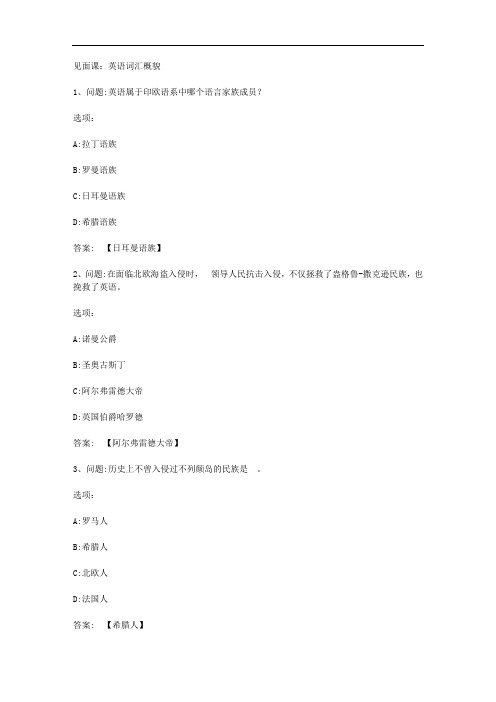
见面课:英语词汇概貌1、问题:英语属于印欧语系中哪个语言家族成员?选项:A:拉丁语族B:罗曼语族C:日耳曼语族D:希腊语族答案: 【日耳曼语族】2、问题:在面临北欧海盗入侵时,领导人民抗击入侵,不仅拯救了盎格鲁-撒克逊民族,也挽救了英语。
选项:A:诺曼公爵B:圣奥古斯丁C:阿尔弗雷德大帝D:英国伯爵哈罗德答案: 【阿尔弗雷德大帝】3、问题:历史上不曾入侵过不列颠岛的民族是。
选项:A:罗马人B:希腊人C:北欧人D:法国人答案: 【希腊人】4、问题:1476年,将印刷术带回英国,为书面英语标准化奠定了最初的基础。
选项:A:William CaxtonB:William TyndaleC:Geoffrey ChaucerD:Samuel Johnson答案: 【William Caxton】5、问题:Samuel Johnson 最主要的贡献是。
选项:A:编纂《英文难字字母顺序表》,解决了人们阅读《圣经》的困难B:编纂《英语词典》,很大程度上规范了英语单词的词义和拼写C:解释钦定版《圣经》,让《圣经》走人老百姓生活D:重新组编莎士比亚作品,焕发莎剧作品新生命答案: 【编纂《英语词典》,很大程度上规范了英语单词的词义和拼写】6、问题:英语的形成主要受哪些历史事件的影响?选项:A:公元449年的盎格鲁-撒克逊入侵B:公元597年圣奥古斯丁(St. Augustine)在英国传播基督教引发的语言文化革命。
C:始于公元787年并持续100多年的北欧海盗入侵D:发生于1066年的诺曼征服(Norman Conquest)答案: 【公元449年的盎格鲁-撒克逊入侵;公元597年圣奥古斯丁(St. Augustine)在英国传播基督教引发的语言文化革命。
;始于公元787年并持续100多年的北欧海盗入侵; 发生于1066年的诺曼征服(Norman Conquest)】7、问题:“两个威廉两本书”分别指的是和。
选项:A:William Caxton和他翻译的《圣经》B:William Tyndale和他翻译《圣经》C:William Shakespeare和他的剧作D:William Alfred和他的《法典》答案: 【William Tyndale和他翻译《圣经》; William Shakespeare和他的剧作】8、问题:现代英语的主要特征是。
mysteries of english
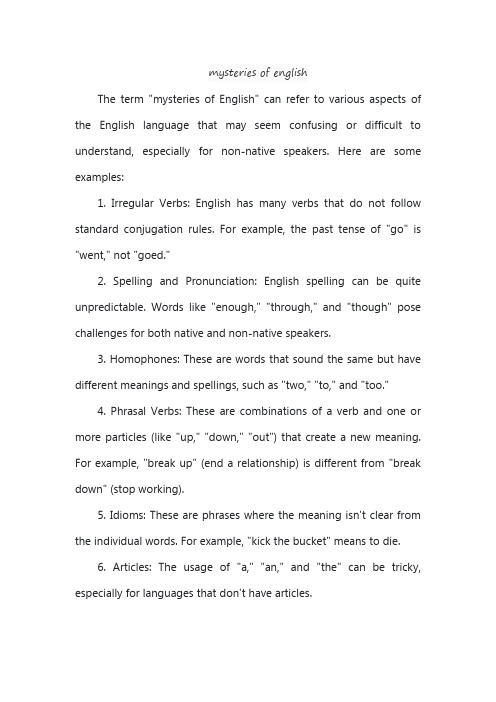
mysteries of englishThe term "mysteries of English" can refer to various aspects of the English language that may seem confusing or difficult to understand, especially for non-native speakers. Here are some examples:1. Irregular Verbs: English has many verbs that do not follow standard conjugation rules. For example, the past tense of "go" is "went," not "goed."2. Spelling and Pronunciation: English spelling can be quite unpredictable. Words like "enough," "through," and "though" pose challenges for both native and non-native speakers.3. Homophones: These are words that sound the same but have different meanings and spellings, such as "two," "to," and "too."4. Phrasal Verbs: These are combinations of a verb and one or more particles (like "up," "down," "out") that create a new meaning. For example, "break up" (end a relationship) is different from "break down" (stop working).5. Idioms: These are phrases where the meaning isn't clear from the individual words. For example, "kick the bucket" means to die.6. Articles: The usage of "a," "an," and "the" can be tricky, especially for languages that don't have articles.7. Tenses: While many languages have simple and consistent tense systems, English has multiple ways to express past, present, future, and even hypothetical actions.8. Prepositions: English has a vast array of prepositions, and their usage can be nuanced. For example, "in," "on," and "at" can all refer to time, but their usage varies ("in the morning," "on Monday," "at 5 o'clock").9. Double Negatives: In standard English, using two negative words in the same sentence often results in a positive meaning, which can be confusing. For example, "I don't need no help" actually means "I don't need help.10. Regional Variations: English is an international language with many dialects and variations. What's considered standard in one country might not be in another.。
《英语词汇的奥秘》词根+词缀+后缀PDF文档

单词的核心—词根1、ag=do, act做,动agential/agenda/agile/agitate/counteragent2、agri=field田地,农田(agri也作agro, agr) agriculture/agrarian/agrestic3、ann=year年(ann也作enn) anniversary/annual/perennial/semiannual4、audi=hear听(audi也作audit) audience/auditorium/auditor/audition5、bell=war战争rebel/rebellious/bellicose/bellicosity6、brev=short短abbreviate/brevity/brief7、ced=go行走(ced也作ceed, cess) precede/ exceed/excess/recede/intercede8、cept=take拿,取except/accept/intercept/incept9、cid, cis=cut, kill切,杀decide/concise/precise/incise/homicide/suicide10、circ=ring环,圆circle/circulate/circuit11、claim, clam=cry, shout喊叫exclaim/proclaim/acclaim/declaim12、clar=clear清楚,明白declare/clarify/clarification13、clud=close, shut关闭(clud也作clus) exclude/include/conclude/seclude14、cogn=know知道cognize/recognize/precognition15、cord=heart心cordial/record/concord/discord/accord16、corpor=body体(corpor也作corp) incorporate/corpse/corpulent17、cred=believe, trust相信,信任credible/credulous/credit/creed18、cruc=cross十字crucial/crucify/excruciate19、cur=care关心,挂念,注意security/curious/cure20、cur, curs, cour, cours=run跑occur/cuurent/excurse/course/precursor21、dent=tooth牙齿dentist/indent22、di=day日diary/dial23、dict=say言,说(dict也作dic) contradict/dictate/predict/indicate24、dit=give给tradition/edit/extradite25、don=give给(don也作do) pardon/condone/donate/anecdote26、du=two二dual/duplicate/duplex27、duc, duct=lead引导educate/introduce/conduct/produce/abduct/induce28、ed=eat吃edible/edacious/edacity29、equ=equal等,均,平equality/adequate/equable/equator/equivocate30、ev=age年龄,寿命,时代,时期medieval/primeval/longevity31、fact=do, make做,作(fact也作fac) factory/benefactor/facile/facture32、fer=bring, carry带,拿confer/differ/different/offer/transfer/aquiferous33、flor=flowr花(flor也作flour) florid/defloration/flourish/noctiflorous34、flu=flow流fluent/influence/fluid/refluence/effluent/influx35、fus=pour灌,流,倾泄refuse/confuse/transfuse/diffuse/profuse36、grad=step, go, grade步,走,级gradual/retrograde/degrade/upgrade37、gram=write, something written or drawn写,画,文字,图形grammar/diagram/telegram/hologram/seismogram38、graph=write, writing, an instrument for making records写,画,文字,图形,记录器photograph/biograph/monograph/psedugraph/polygraph39、gress=go, walk行走progress/retrogress/aggress/digress/regress/ingress40、habit=dwell居住habitant/inhabit/cohabit/cohabitant41、hibit=hold拿持exhibition/inhibit/prohibit42、hospit=guest客人hospital/hospitable/hospitality43、idio=peculiar, own, private, proper 特殊的,个人的,专有的idiom/idot44、insul=island岛peninsular/insular/insulate/45、it=go行走exit/initial/transit/transitory/circuit/itinerate/seditious46、ject=throw投掷project/inject/reject/subject/object/eject/abject/deject47、juven=young年轻,年少juvenile/rejuvenate/rejuvenescent48、lect=choose, gather选,收(lect也作leg, lig)select/intellect/elegant/neglect49、lev=raise举,升elevate/lever/relieve/alleviate50、liber=free自由liberate/liberty/liberticide/liberalize51、lingu=language语言linguistic/bilingual/collingual52、liter=letter文字,字母literate/illerate/literature/obliterate/literal53、loc=place地方local/locomotive/locate/collocate/translocate54、log=speak言,说dialogue/eulogy/apology/dyslogy/logical/philogy55、loqu=speak言,说eloquent/colloquial/magniloquent/obloquy56、lun=moon月亮lunar/luniform/circumlunar57、man=dwell, stay居住,停留mansion/permanent/remanent/immanent58、manu=hand手(manu也作man) manuscript/manufacture/manumit59、mar=sea海marine/submarine/mariculture60、medi=middle中间immediate/medium/mediate/intermediate/medieval61、memor=memory记忆memory/commemrorate/remember62、merg=dip, sink沉,没(merg也作mers) emerge/emergent/immerge63、migr=remove, move迁移migrate/emigrate/immigrate/transmigrate64、milit=soldier兵military/militarism/militant65、mini=small, litter小(mini也作min) minister/administer/disminish66、mir=wonder惊奇,惊异mirror/admire/miracle/miraculous67、miss=send投,送,发(miss也作mit)missile/dismiss/mission/manumit/remit/intermit/emit/immit/promise/commit68、mob=move动mobile/mob/mobbish/mobocrat69、mort=death死mortal/immortal/postmortem70、mot=move移动,动motion/promote/demote/remote/locomote71、nomin=name名nominal/nominate/denominate/ignominous/innominate72、nov=new新novel/novelette/novice/innovate/renovate73、numer=number数numeral/numerate/enumerate74、onym=name名onymous/anonymous/synonym/antonym75、oper=work工作operate/operose/cooperate/opera76、ori=rise升起orient/origin/original/originate77、paci=peace和平,平静pacific/pacify/repacify78、pel=push, drive推,逐,驱propel/expel/repel/dispel/compel/impel79、(a)、pend, pens=hang悬挂depend/independent/suspend/(b)、pend,pens=weigh称量dispense/pensive/perpend/ponder (c)、pend, pens=pay 付钱,支出,花费 expend/expense/spend/pension80、pet=seek追求compete/appetite/petition/81、phon=sound声telephone/symphony/phonetic/euphonious/phonic82、pict=paint画,描绘picture/picturesque/depicture/pictorial83、plen=full满,全plenty/plenilune/deplenishi/replenish84、plic=fold折,重叠complicate/explicate/supplicate/implicate/duplicate85、pon=put放置postpone/component/propone/exponent/opponent86、popul=people人民population/popular/populace87、port=carry拿,带,运portable/import/export/transport/deport/portage88、pos=put放置expose/compose/oppose/dispose/propose/interpose/deposit89、preci=price价格 precious/appreciate/depreciate/praise90、punct=point, prick点,刺punctuate/punctual/compunction/pungent/91、pur=pure清,纯,净purify/depurate/purism92、rect=right, straight正,直correct/rectify/rectitude/erect/direct/rectangle93、rupt=break破rupture/interrupt/disrupt/corrupt/irrupt/erupt94、sal=salt盐salary/salify/salty/desalt95、scend, scens=climb爬,攀ascend/descend/condescend/transcend96、sci=know知science/conscious/subconscious/conscience/prescient97、sec, sequ=follow跟随second/persecute/consecution/sequence/consequence98、sect=cut切割insect/section/dissect/transect/resect/intersect99、sent, sens=feel感觉sentiment/consent/consensus/resent/nonsense/assent100、sid=sit坐president/resident/subside/assiduous101、sist=stand站立resist/consist/assist/exist/insist/persist102、son=sound声音sonic/unison/resonate103、spect=look看 spectacle/prospect/inspect/expect/respect/suspect/spectate104、spir=breathe呼吸conspire/inspire/expire/respire/spirit/perspire105、tail=cu t 切割tailor/detail/retail/retailor106、tain, ten, tin=hold握,持,守contain/obtain/sustain/tenant/abstain107、tect=cover覆盖detect/protect/unprotected108、tele=far远telegram/telecontrol/telecast/teleswitch109、tempor=time时temporary/extemporize/temporal110、tend ( tens, tent )=stretch伸 extend/attend/contend/tendency/tent111、terr=earth, land 土地,陆地territory/terrace/inter/subterrane112、text=weave编织textile/text/context/contextual/pretext113、tract=draw拉,抽,引tractor/attract/protract/contract/extract/retract114、un=one一(un也作uni) unite/unanimous/unanimity/unilateral115、urb=city城市suburb/urban/inurbane/exurb/conurbation116、vac=empty空(vac也作vacu) vacation/vacant/evacuate/vacuous117、vad ( vas )= walk, go行走invade/evade/pervade/wade/waddle118、vari=change variable/various/variation/variform119、ven=come来intervene/convene/prevent/event/avenue/revenue120、vert, vers=turn转advertise/anniversary/adverse/divorce/reverse/versatile121、vi, via=way路obvious/trivial/deviate122、vis, vid=see看visible/advise/revise/supervise/provident/evident123、vit=life生命vital/vitamine124、viv=live活survive/revive/vivid ————————————————————————————— 125、aer ( o )空气,空中,航空 aerial/aerify/aerogram126、alt高 altitude/exalt/exalted127、am爱 amateur/amour/amorous128、ambul行,走 ambulant/noctambulation/somnambulate129、anim生命,活,心神,意见animal/animate/unanimous/magnanimous 130、anthrop (o)人,人类 anthropology/anthropoid/philanthropic131、aqu水aquatic/aqueous/aqualung132、arch统治者,首脑archy统治monarch/polyarchy/gynarchy133、avi鸟avian/aviate/aviator134、bat打combat/battle/debate135、biblio书bible/bibliography136、brig战斗,打 brigade/brigand/brigandish137、cad, cas降落,降临decadence/case/casual/occasional138、cert确实,确信certify/certain/ascertain139、chron时chronic/synchronal/chronicle140、cid降落,降临accident/incident/coincide/occident/deciduous141、clin倾decline/incline/recline142、cosm (o)世界,宇宙cosmic/cosmopolis/microcosm143、cracy统治crat支持(或实行)—统治的democracy/autocratic/monocrat 144、cub躺,卧incubate/incubus/concubine145、cult耕,培养cultivate/culture/aviculture146、cycl ( o )圆,环,轮bicycle/cyclical/cyclone147、dem ( o )人民democrat/demagogic/endemic/epidemic/pandemic 148、dexter右dexter/dexterous/dextral149、doc教doctorate/doctrine/docile/docent150、dom屋,家domestic/domicile/dome151、dorm睡眠dormitory/dormant/dormitive/endorm152、drom跑aerodrome/dromometer153、ego我egoism/egomania154、err漫游,走,行erratic/error/aberrant155、fabl, fabul言fable/fabled/confabulate/effable156、feder联盟federal/federate/confederate157、ferv沸,热 fervid/fervent/perfervid158、fict,fig塑造,虚构fiction/fictitious/prefigure/transfigure159、fid信任confide/confident/confidant/diffident160、fil线filar/file/defile/profile161、flate吹inflate/deflate/conflation162、flect, flex弯曲reflect/flexible/flectional163、flict打击afflict/conflict/inflict164、frag, fract破,折fagile/fragment/fracture/refract165、frig冷frigid/refrigerator/frigidarium166、fug逃,散 refuge/refugee/insectifuge167、fund, found底,基础profound/fundament/foundational168、gam婚姻monogamy/bigamy/polygamy169、gran谷物,谷粒grange/granulate/granular170、grav重gravid/grave/gravity/aggravate/grieve171、greg群,集合gregarious/aggregate/congregate/segregate172、gyn, gynec( o )妇女gynecology/philogyny/monogyny/polygyny173、hal呼吸inhale/exhale/halitosis174、helic ( o )螺旋 helicopter/heliport/helical/helicoid175、hes, her粘着 hesitate/adhere/cohere/inhere176、ign火ignite/ignitable177、integr整,全integral/integrate/disintegrate/integer178、junct连接,连结junction/conjunct/adjunct179、later边 unilateral/equilateral180、leg读legible/legend/legendry181、leg, legis法legal/illegal/privilege/legislate182、luc光lucid/elucidate/translucent/lucifugous183、lumin光luminary/luminous/illuminate/relumine184、magn ( i ) 大 magnanimous/magnify/magniloquent/magnitude/magnifico 185、matr ( i ), metro母matriarch/matrimonial/metropolis/metropolitan 186、mega大megalith/megapod/megascopic187、mens测量immense/dimension/mensurable188、ment心,神,智,思,意mental/dement/mention/mentor/ament189、min伸出,突出 prominent/eminent/preeminent/imminent190、misc混合,混杂miscible/promiscuous/miscegenation191、mis ( o )恨,厌恶misanthropy/misogamy/misogynic/misoneism192、mon告诫,提醒 monument/monitor/admonish193、mon单独,一个monk/monastic/monism194、mur墙 mural/mure/intermural195、mut变换mutable/mutation/mutual/commute/permute/transmute 196、nat诞生natal/nation/native197、nav船navy/navigate/navicular198、nect, nex结,系connect/disconnect/annex199、negr, nigr黑nigrify/negritude/nigrescent200、nihil无annihilate/nihilism/nihility201、noc, nox伤害innocent/nocuous/noxious202、noct ( i )夜noctilucent/noctambulant/equinoctial203、norm规范,正规,正常normal/abnormal/enormous204、nutri营养nutriology/nutritive/nutrition205、orn装饰adorn/ornate/ornament/suborn206、par生,产parent/primipara/fissiparous207、parl说,谈parley/parliament/parlance208、past喂,食pasture/depasture/pastor(shepherd)209、path ( o ), pathy 疾病,疗法pathology/hydropathy/neuropathy 210、patri ( i )父,祖patriarch/patriot/expatriate/repatriate/patron 211、ped脚,足expedition/pedal/centipede/impede212、ped儿童,小孩pedagogy/pedant/pediatric213、petr ( o )石petrolic/petrify/petrous214、phag吃anthropophagous/dysphagia/polyphagous215、phil ( o )爱philanthropy/philogyny/philology/Japanophile 216、phob ( ia )怕photophobia/hydrophobia/neophobia/zoophobia 217、plex重叠,重 complex/duplex/perplex218、polis城市necropolis/cosmopolis/metropolis219、prim第一,最初primary/primitive/primipara/primeval/premier 220、radic根radical/eradical/radicate/radish221、ras, rad檫,刮erase/abrade/abrase/raze/razor222、rid, ris笑ridicule/ridiculous/deride/risible223、rod,ros咬,啮rodent/corrode/erosive/anticorrosive224、rot轮,转 rotate/rotund/circumrotate225、rud原始,粗野rude/rudiment/erudite226、rur, rus农村rural/rustic/rusticate227、sat, satis, satur足,满,饱satiate/satisfy/saturable/saturate 228、sen老senior/senate/senile/senescent229、simil, simul相似,相同similar/facsimile/simulate230、sol单独sole/solitude/desolate231、sol太阳solar/insolate/extrasolar232、soph智慧philosopher/pansophic/sophist233、sper希望desperate/desperado/despair234、spers, spars散,撒disperse/asperse/sparse/sparsity235、splend发光,照耀splendid/resplendent236、stell星stellar/constellation/interstellar237、tact, tag触tactile/contact/contagious/intact238、the ( o )神theism/atheistic/theocratic239、ton音tone/tonetic/240、tort扭extort/contort/distort/retort241、tour迂回,转tourism/detour/contour242、trud, trus推,冲intrude/protrude/intrusive243、tut, tuit监护,看管tutor/tutorial/tuition244、umbr阴影umbrella/adumbrate245、ut,us用utility/inutile/usage/usurious246、vag走,漫游extravagan/vague/vagrant/divagate/vagarious 247、val 强invalid/valiant/valorous/convalesce248、van空,无vanish/vanity/evanish249、ver ( i )真实very/verify/verity250、voc, vok声音,叫喊vocal/revoke/provoke/evoke/advocate 251、vol, volunt意志,意愿 volition/benevolent/volunteer 252、volu, volv滚,转volume/evolve/involve/revolution/revolveMade by ZnPMg 2007-02-06单词的附件——词缀(一)前缀1.a-①无、不、非acentric②含有in, on, at, by, with, to, of等意义asleep③加强意义aloud2.ab- 离去、相反、不abnormal/abuse/abduct3.ac- 含有at, to 之意,或表示加强及引申意义accustom/account/acquit4.ad- 含有at, to 之意,或表示加强意义adjust/adventure/adjunction5.af-含有at, to 之意,或表示加强意义affamish/affirm6.ag-含有at, to 之意,或表示加强意义aggravate/aggrieve7.amphi-两,双amphibiology/amphibian水陆两栖8.an-①无、不annoynmous/anarchism/anharmonic②加强或引申意义annotate/annihilate/announce/annul9.ante-前、先anteroom/antedate/antecessor10.anti-反对、相反、防止antiwar/anticontagious11.ap-加强或引申意义appoint/appease/apprehension/approximate/appraise12.apo-离开(亦作ap-)apology13.ar-含有at, to 之意,或表示加强及引申意义arrange/arrect/arrive14.as-含有at, to 之意,或表示加强及引申意义assimilate/assort/assign15.at-含有at, to 之意,或表示加强及引申意义 attract/attrap16.auto-自己、自动autorotation/autobiography17.be-①使…使成为…belittle/becalm/benumb②加以…饰以…用…(做某事)bepowder/becloud③在beside/below/before/behind④表示加强及引申意义belaud/besiege/bemoan18.bene-善、好benevolent/beneficent19.bi-两,二bilingual/bilateral/bicycle20.by-旁、侧、非正式、副byroad/bywork/byname21.circum-周围、环绕circumplanetary/circumsolar22.co-共同cooperation/coagent/comate23.col-共同collaboration/collocate/collingual-①共同compatriot/compassion②加强或引申意义compress/commix25.con-①共同concentric/conjoin/condominate②加强或引申意义conclude/consolidate/confront/contribute/confirm/condense26.contra-反对、相反、相对contraclockwise/contradi ct27.cor-①共同、互相correlation/correspond②加强或引申意义correct/corrupt/corrival28.counter-反对、相反counterattack/counteroffensive29.de-①否定、非、相反destruction/decompose②除去、取消、毁desalt/depollution/decode③离开 detrain/deplane ④向下、降低、减少depress/devalue/depopulation⑤使成…作成…或仅作加强意义delimite/design/depicture30.deca-十decameter/decagram31.deci-十分之一decilitre32.demi-半demigod/demilune33.di-二、双ditheism/digamy/dioxide/diacid34.dia-贯穿、对穿、穿过、透过dialogue/diameter/diathermal35.dif-分开、否定、不diffluence/differ/diffuse36.dis-①不、无、相反dislike/disability②取消、除去、毁disroot/discourage/disarm③加在含有“分开”、“否定”等意义的单词之前,dis-则作加强意义dispart/dissemination/disannul④分开、离、散dissect/dispense/dissolve [注] dis-有时也作di-divert/digress/divorce37.dys-不良、恶、困难dysfunction/dysphonia38.e-①加强或引申意义,使…evaluate/evaporate②出、外eject/erupt/emigrate/emerge/evade③除去eradicate39.ef-出、离去effluence40.em-①表示“置于…之内”、“上…”embay/embed ②表示“用…做某事”、“饰以…”、“配以…”embalm/embar③表示“使成某种状态”、“致使…”、“使之如…”、“作成…”embody/empower41.en-①表示“置于…之中”、“登上…”、“使上…”encase/encage/enroll ②表示“用…来做某事”、“饰以…”、“配以…”entrap/enchain/encloud③表示“使成某种状态”、“致使…”、“使之如…”、“作成…”enlarge/endanger/enrage/enrich/enable④加在动词之前,表示“in ”,或只作加强意义enclose/entrust/entangle42.endo-内endoparasite43.ennea-九enneagon44.eu-优、善、好euphonic45.ex-①出、外、由…中弄出 export/expose/exhume/expel②前任的、以前的ex-president③表示“使…”、“做…”,或做加强意义 exalt/exaggerate46.exo-外、外部exogamy/exosphere47.extra-以外、超过extraordinary/extrasolar48.fore-前、先、预先foretell/forerun/foresee49.hecto-百hectowatto50.hemi-半hemisphere51.hepta-七(在元音前作hept-) heptarchy52.hetero-异heterosexual53.hexa-六(在元音前作hex-)hexagon54.holo-全hologram/holocrystalline55.homo-同homosexual/homophone/homograph56.hyper-超过、过多、太甚hypersexual/hypermilitant57.hypo-下、低、次、少 hypotension58.il-用在l之前①不、无、非illegal/illiterate②加强或引申意义 illustrate59.im- (用在b, m, p 之前)①不、无、非 imbalance/immortal/impossible②向内、入imbibe/immerge③加强意义,或表示“使成…”、“饰以…”、“加以…”impel/impulse/impassion60.in- ①不、无、非inglorious/insensible ②内、入 inside/inject③加强意义, 或表示“使…”、“作…”inflame/incurve61.infra-下、低infrastructure/infrasound62.inter- ①在…之间、…际 international②互相 intercourse/interview63.intra-在内、内部 intraparty64.intro-向内、入内introduce/intromit65.ir-(用在r之前)①不、无irristable/irresolute/irrelative②向内、入irrigate/irruption66.iso-等、同 isomorph/isotherm67.kilo-千 kilogram68.macro-大、宏、长 macrobian/macropod长足的69.mal-恶、不良、失、不(亦作male-)maltreat/malediction70.meta-①超 metaphysical②变化 metagenesis71.micro-微 microskirtli-(亦作mill- 与 mille-)①千分之一、毫millimeter②千millennial/millipede73.mini-小miniskirt/minicrisis74.mis-误、错、恶、不misspell/misuse/misdoing/mistrust75.mono-单一、独(在元音前作mon-)monarch/monoxide76.multi-多multilateral/multilingual77.neo-新neogamist/neonatal/neolithic78.non-①不nonaligned②非nonage③无nonelastic79.octa- (亦作octo- 与 oct-)octolateral/octavalent八价的80.omni-全、都、公、都omnipotent/omniform81.out-①超过、胜过outnumber②过度、太甚 outspend ③外、出outdoor④除去outroot82.over-①过度、太甚overpraise②在上、在外、从上、越过oversea/overleap/overlook③颠倒、反转 overthrow83.paleo-古、旧paleobotany/Paleolithic84.pan-全、泛pantheism/pantropical85.para-①半、类似、准parareligious ②辅助、副 paralegal/paramedic③旁、靠近、外parasite/parabiosphere ④错误、伪paraphasia 语言错乱86.para-①防、避开、保护parasol(sol=sun防止日晒) /parachute(chute=fall保护降落) para-代替parachute,现已被广泛使用,它表示“空投”、“空降”、“伞投”、“伞兵”、“降落伞”等意义。
英语词汇的奥秘智慧树知到课后章节答案2023年下武汉科技大学
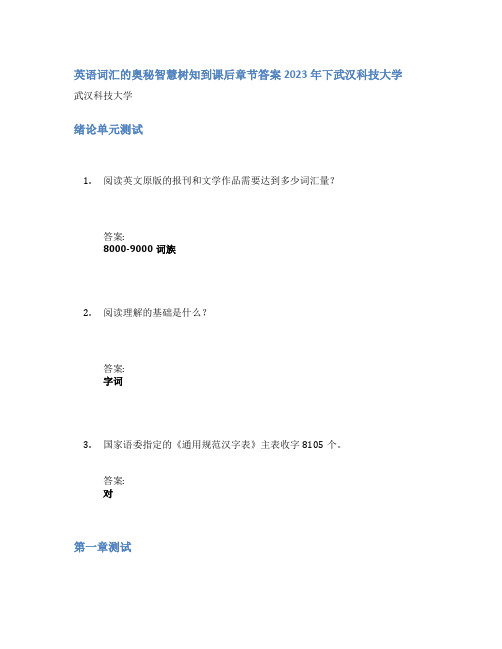
英语词汇的奥秘智慧树知到课后章节答案2023年下武汉科技大学武汉科技大学绪论单元测试1.阅读英文原版的报刊和文学作品需要达到多少词汇量?答案:8000-9000词族2.阅读理解的基础是什么?答案:字词3.国家语委指定的《通用规范汉字表》主表收字8105个。
答案:对第一章测试1.英语是英伦三岛的本土语言。
答案:错2.古英语阶段,英语中的外来语主要是法语。
答案:错3.中古英语阶段,英语单词的读音和拼写都产生了很大的改变。
答案:对4.诺曼征服后,为了更好地统治英国,法国统治者以英语为主要交流语言。
答案:错5.法语构词成分的进入,极大地增强了英语的构词能力。
答案:对6.英语中的词缀,都是英语本族语构词成分。
答案:错7.在现代英语早期阶段,英语就已经成为一门世界性的语言。
答案:错8.英语中的外来词源,主要是拉丁语、希腊语和德语。
答案:错9.英语中的外来语单词数量远远高于本族语单词数量。
答案:对10.(),标志着英语逐步走入正轨,确立其国语的正式地位。
答案:塞缪尔编纂的《英语词典》的问世11.中古英语阶段,法语对英语的影响主要表现在哪些方面?答案:改变英语单词的发音和拼写;简化英语单词的词尾;增加英语单词的同义表达;影响英语单词的词义12.下列哪些单词是外来语单词?答案:doctorate;longevity第二章测试1.英语中不可再分的语言单位是语素。
答案:对2.汉语中,“人”和单人旁“亻”都是语素,都表达“人”的基本含义。
答案:对3.语素变体是同一个语素的不同表现形式,表达不同的语义。
答案:错4.一个语素受其前后语素字母发音的影响,呈现出不同的变体形式。
答案:对5.可以独立做单词使用的语素叫自由语素。
答案:对6.词根是一个单词中最重要的语素。
答案:对7.曲折词缀附加在词基上,能够生成新的单词。
答案:错8.英语中的曲折词缀都是后缀,表示词的语法意义。
答案:对9.从构词的角度来说,nature、natural和naturalization在英语里算作3个不同的单词。
如何快速提高英语口语,你不知道的英语单词小秘密

如何快速提高英语口语,你不知道的英语单词小秘密(文/太平洋英语)The shortest complete sentence in the English language consists of only one word and that is “Go”.英语里由一个单词组成的最短的完整的句子就是“GO”。
The oldest word in the English language is “town”.英语里最有年头的一个词是“town(城镇)”。
In England, till 1880s using the word “pants” was considered indecent.在英国19世纪80年代以前,说“pants(裤子)”这个词都会被人家认为不礼貌。
(裤子好命苦~)The word “goodbye” came from “God bye”, which in turn comes from “God be with you”.“goodbye(再见)”这个词其实是由“God bye”演变而来,而“God bye”又演变自“God be with you”。
According to the Oxford English Dictionary, the longest word in the English language is “p neu monoultramicroscopicsilicovolcanokoniosis”. The only other word with so many letters is its plura l, “pneumonoultramicroscopicsilicovolcanokonioses”.牛津字典里收录的最长单词是“pneumonoultramicroscopicsilicovolcanokoniosis(硅酸盐沉着病就是传说中的矽肺病)”。
英语词汇的奥秘 升级版词汇量

英语词汇的奥秘升级版词汇量The Mystery of English Vocabulary: An Upgraded Vocabulary JourneyEnglish is a language that has evolved over centuries, absorbing and adapting words from various linguistic sources. Its vast vocabulary is a testament to the richness and complexity of the language, offering a unique challenge and opportunity for learners. This essay delves into the intriguing world of English vocabulary, exploring the mysteries and nuances that lie beneath the surface.One of the most captivating aspects of English vocabulary is its diversity. The language boasts a staggering number of words, with estimates ranging from 170,000 to over 1 million lexical items. This expansive lexicon can be attributed to the language's historical roots, which span across multiple continents and cultures. From the Anglo-Saxon foundations to the influx of Norman French, Latin, and Greek influences, English has become a melting pot of linguistic influences, each contributing to its ever-growing vocabulary.Delving deeper into the origins of English words, one can uncover fascinating stories and connections. For instance, the word "salary" is derived from the Latin term "salarium," which referred to theallowance given to Roman soldiers to purchase salt, a precious commodity at the time. Similarly, the word "quarantine" has its roots in the Italian phrase "quaranta giorni," meaning "forty days," which was the duration of isolation imposed on ships during the plague outbreaks in Venice.The multilayered nature of English vocabulary also presents a unique challenge for learners. While some words may have direct and straightforward meanings, others can be laden with nuances, connotations, and subtle shades of meaning. Take the words "glad" and "happy," for example. While they both convey a sense of joy and positive emotion, "glad" often implies a more temporary or specific feeling, while "happy" suggests a more sustained state of well-being.Synonyms, another fascinating aspect of English vocabulary, can further complicate the learning process. Words that appear to have similar meanings can actually carry distinct connotations or implications. The words "assert," "insist," and "demand" all convey a sense of assertiveness, but they differ in their intensity and the underlying tone. Understanding these subtle distinctions is crucial for effective communication and precise expression.Mastering English vocabulary also involves delving into the world of idioms, phrasal verbs, and colloquialisms. These linguistic elements add depth and richness to the language, but they can be particularlychallenging for non-native speakers. Idioms, such as "let the cat out of the bag" or "break a leg," often defy literal translation and require a deep understanding of cultural context and nuance.Phrasal verbs, which combine a verb with a preposition or adverb, can also be a source of confusion. The same verb can take on vastly different meanings when paired with different particles, as seen in the examples "look up," "look down on," and "look into."In the face of these challenges, learners may feel overwhelmed, but the rewards of mastering English vocabulary are immense. A robust vocabulary not only enhances one's communication skills but also opens the door to a deeper understanding of the language and the cultures it represents. It allows individuals to express themselves more precisely, convey subtle shades of meaning, and engage in more nuanced and engaging conversations.To tackle the daunting task of vocabulary expansion, learners can employ a variety of strategies. Regular reading, exposure to diverse media, and active engagement with the language through writing and speaking are all effective ways to build vocabulary. Additionally, the use of mnemonic devices, word roots, and contextual clues can aid in the retention and retrieval of new vocabulary.In conclusion, the mystery of English vocabulary is a captivating andever-evolving journey. From the historical origins of words to the intricate web of synonyms, idioms, and phrasal verbs, the English language offers a rich tapestry of linguistic complexity. By embracing the challenges and delving into the nuances of vocabulary, learners can unlock the true power of the English language, enhancing their communication skills and gaining a deeper appreciation for the beauty and diversity of this global tongue.。
原理英语单词

原理英语单词In the vast and intricate tapestry of human communication, the English language stands as a towering edifice, built upon the principles of vocabulary and grammar. At its core, the principles of English vocabulary are the lifeblood of this language, flowing through every sentence, paragraph, and discourse, shaping our thoughts and ideas into words that can be understood and shared.The principles of English vocabulary are rooted in its etymology, the historical origin and development of words. Understanding the etymology of a word can provide profound insights into its meaning and usage. For instance, the word "democracy" derives from the Greek words "demos" meaning "people" and "kratos" meaning "rule". This etymologicallink reveals the fundamental principle of democracy: rule by the people.The principles of English vocabulary are also evident in its morphology, the structure and formation of words. English is a highly inflective language, with words that can change their form to express different grammatical functions. For instance, the verb "run" can be inflected to"runs," "ran," and "running" to express different tenses and aspects. This morphological flexibility allows English to convey complex ideas with precision and clarity.Moreover, the principles of English vocabulary are reflected in its semantics, the meaning and relationships between words. English is a rich language, with a vast array of synonyms, antonyms, and homonyms that add nuance and precision to our communication. For instance, the words "happy," "joyful," and "delighted" all express positive emotions but with different intensities and connotations. The principles of English vocabulary are not static; they evolve and adapt over time. The influx of new words and phrases, such as "smartphone," "selfie," and "blog," reflect the changing times and the emergence of new technologies and social phenomena. This dynamism is a testament to the vitality and resilience of the English language.In conclusion, the principles of English vocabulary are the fundamental building blocks of this global language. They are the glue that binds together the threads of human communication, allowing us to express our thoughts, ideas,and emotions with precision and clarity. By understanding and appreciating these principles, we can unlock the full potential of the English language and harness its power to connect, communicate, and create.**英语词汇的原理:解锁英语词汇的奥秘**在人类沟通的广阔而复杂的织锦中,英语语言就像一座巍峨的建筑,建立在词汇和语法的原则之上。
从词汇学的角度谈英语生词的记忆法

从词汇学的角度谈英语生词的记忆法English:When it comes to memorizing new English vocabulary, several techniques from the field of linguistics can be helpful. One effective method is the use of mnemonic devices, which are memory aids that link new words to familiar concepts or images. For example, creating vivid mental images associated with the word's meaning or its pronunciation can aid in retention. Another strategy is employing word association techniques, where you connect the new word with a word or concept you already know well. This helps in forming mental connections between the new vocabulary and your existing knowledge, facilitating recall. Additionally, practicing active recall by repeatedly using the new word in different contexts reinforces memory retention. Contextual learning is also crucial; understanding how the word is used in sentences or conversations helps solidify its meaning and usage patterns. Furthermore, breaking down complex words into smaller components or recognizing word roots and affixes can assist in deciphering the meaning of unfamiliar terms. Regular exposure to the language through reading, listening, and speaking is vital for reinforcing vocabulary acquisition. Finally,creating personalized vocabulary lists and reviewing them regularly can enhance long-term retention.Translated content:在记忆新的英语词汇时,可以借鉴语言学领域的几种技巧。
Secrets of english words

——蒋争著
〃第一部分 单词的核心→→词根
1、ag 做,动
Agent ag 做,办理 ent 名词后缀 表示人; 做事者,办理人代理人 Agential ial 形容词后缀 ……的 代理人的 Subagent sub 副的, agent 代理人 副的代理人 Coagent co 共同, ag 做,ent 表示人 共事者 合作者 Agency ag 做,ency 名词后缀 代理 代理处 机构 作用 Agenda ag 做,作, end 名词后缀, a 表复数 议事日程 Agile [‘ædʒail] ag 动—活动—灵活 ile 形容词后缀…..的 灵活的 敏捷的
Except ex- 出,去 cept 拿 除…之外,把…除外 Exception形容词 -tion名词后缀 例外 除外 Exceptional -al 形容词后缀…的 例外的,特殊的,异常的 Exceptive -ive 形容词后缀..的 作为例外的 特殊的 Accept ac 加强意义 cept 拿,接 接受 领受 承认 Acceptance -ance名词后缀 接受 领受 承认 Acceptable -able形容词后缀 可…的 可接受的 Intercept inter中间 cept拿 (从中截取) 截取 拦截 Interception 截取 拦截 截住 Intercepter -er表示物 截击机 Incept in入 cept拿 接受 摄入 摄取
Agitate [‘ædʒiteit] ag-动,-it-ate 动词后缀 使……
―使骚动”→ 鼓动,煽动,搅动,使不安定
论“英语词汇的奥秘”对提高英语词汇记忆能力的作用

论“英语词汇的奥秘”对提高英语词汇记忆能力的作用
论“英语词汇的奥秘”对提高英语词汇记忆能力的作用【摘要】本文通过阐述英语词汇学习的重要性及所面临的问题和困难,对“英语词汇的奥秘”这本书的内容、结构及对学习英语词汇的积极作用进行了简单介绍。
【关键词】英语词汇的奥秘;词根;词缀
一、英语词汇学习的重要性
对于英语学习者来说,词汇学习可谓重中之重,原因就是其在整个语言学习中的重要性。
词汇的积累犹如高楼建设,没有一块块红砖的积累,高楼无法平地而起。
头脑中没有词汇的库存,英语语言无法正常使用。
对于听、说、读、写、译几个方面来说,英语词汇的重要性也非常突显。
如果词汇匮乏,听和说会严重受限,听力水平的不断提高也是天方夜谭,口语表达的过程中,满脑子思想,可是苦于没有词汇作载体,英语学习者的自信心会被一点点蚕食;如果词汇掌握的不好,阅读过程中障碍重重;如果词汇量小,即使头脑中构建了多么清晰的结构,思想多么独特,都无法完成一篇好的写作作品;如果词汇不丰富,翻译出的译文不但与原文质量无法媲美,甚至容易导致因选词错误而产生的歧义现象。
wilkins(1972)说过,没有语法,表达甚微;没有词汇,表达为零。
词汇学家mccarth (1990)说的更干脆,一个学生学习第二语言,其语法无论学得多么好,语音无论掌握的多么漂亮,没有词汇来表达各种意义,语言交际就难以实现(no matter how well the student learns grammar,no matter how successfully he masters the sounds of a l2,。
(2021年整理)解密英语思维有什么奥秘
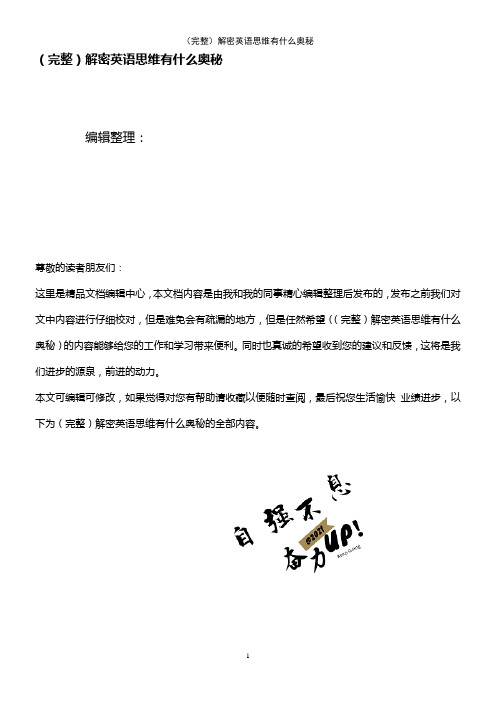
(完整)解密英语思维有什么奥秘编辑整理:尊敬的读者朋友们:这里是精品文档编辑中心,本文档内容是由我和我的同事精心编辑整理后发布的,发布之前我们对文中内容进行仔细校对,但是难免会有疏漏的地方,但是任然希望((完整)解密英语思维有什么奥秘)的内容能够给您的工作和学习带来便利。
同时也真诚的希望收到您的建议和反馈,这将是我们进步的源泉,前进的动力。
本文可编辑可修改,如果觉得对您有帮助请收藏以便随时查阅,最后祝您生活愉快业绩进步,以下为(完整)解密英语思维有什么奥秘的全部内容。
享受英语第一步-—解密英语思维(1)斯大林说:“语言是直接与思维联系的,它把人的思维活动的结果、认识活动的情景,用词及由词组成的句子记载下来,巩固起来,这样就使人类社会中的思想交流成为可能."的确,没有思维就没有语言,用词汇组成不同句子表达不同的意思,正是思维在起作用。
既然语言和思维关系那么密切,那么在英语教学中进行英语思维的训练就显得尤为重要。
我一直认为,思维的正确与否是我们真正开始享受英语的第一步。
1 中国人学习英语的误区在现实生活中,不少英语学习者发现在交际过程中有时不能很好地表达自己的思想或理解别人的情感,会闹出不少笑话的Chinglish (中国式英语).错误案例A:按字面意思一个一个翻译比如像我们从小就提倡的口号:“好好学习,天天向上。
”有的同学翻译成:“Good good study, day day up。
"像我们的成语:“马马虎虎",有同学就翻译成“Horse horse,tiger tiger.”还有“人山人海”被翻译成:“People mountain, people sea。
” 五花八门,笑话百出.错误案例B:不了解英语的文化背景句子:Tom 是第一个吃螃蟹的人,他对我们公司进行了重大的改革。
错误英文翻译:Tom is the first person to eat the crab of making a great revolution for our company。
- 1、下载文档前请自行甄别文档内容的完整性,平台不提供额外的编辑、内容补充、找答案等附加服务。
- 2、"仅部分预览"的文档,不可在线预览部分如存在完整性等问题,可反馈申请退款(可完整预览的文档不适用该条件!)。
- 3、如文档侵犯您的权益,请联系客服反馈,我们会尽快为您处理(人工客服工作时间:9:00-18:30)。
英语词汇的奥秘
Secrets of English Words
简介:大多数的中国学生,对英语单词都采取的都是死记硬背的方法。
永远背不完,一直记不住。
而当初我们学汉字的时候,也知道要学偏旁部首,方便理解和记忆。
英语的词根就类似汉语的偏旁部首。
了解了英语单词的结构以后,那么对于记忆单词,或是推测单词的意思都有一定的帮助。
本节目主要是帮助英语学习者了解词根的重要性,提供一个更为科学的记单词的方法。
参考的文献来自于蒋争的《英语词汇的奥秘》
词根第八站: clar
clar = clear 清楚,明白
初遇clar,
含义很难猜,
添e写成clear,
意义清楚又明白
今天为大家扩展以clar为词根的单词
1. declare (de-加强含义,clar = clear 清楚,明白;to make clear,使...明白) 表明,声明,宣布
2. declarer (见上,-er者) 宣告者
3. declaration (见上,-ation 名词后缀) 声明,宣告,宣布
4. declarative (见上,-active 形容词后缀) 宣告的,公告的,说明的
5. clarify (clar = clear 清楚,明白,-fy动词后缀,使...明白) 讲清楚,阐明,澄清
6. clarification (见上,-fication名词后缀) 阐明,澄清
7. clarity (见上,-ity名词后缀) 清澈,透明
文章出处:/html/ability/words/wordssecrets/20150107/95138.html。
